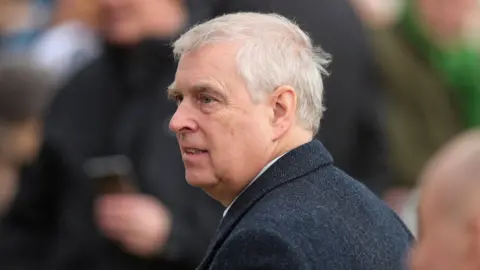 Reuters
ReutersPrince Andrew has said he “ceased all contact” with a businessman accused of being a Chinese spy after receiving advice from the government.
In a statement, his office said Prince Andrew had met the man “through official channels” and there was “nothing of a sensitive nature ever discussed”.
The alleged spy has been banned from the UK following a judgement by the UK’s semi-secret national security court.
The man, known only as H6, was described in court as a “close confidant” of Prince Andrew who had formed an “unusual degree of trust” with the duke.
In 2023, H6 brought an appeal against his initial ban but the decision has been upheld by the court.
Judges were told the businessman was attempting to leverage Prince Andrew’s influence.
The duke’s office said he was “unable to comment further on matters relating to national security”.
His statement did not specify when he ceased contact with the man nor the duration of their communications.
Buckingham Palace declined to comment, saying they do not act for the prince, who is not a working royal.
China’s embassy in the UK has denied the espionage claim saying “some individuals in the UK are always eager to fabricate baseless ‘spy’ stories targeting China”.
“Their purpose is to smear China and disrupt normal exchanges between Chinese and British personnel,” a spokesperson for the embassy said.
The former home secretary Suella Braverman banned H6 from the UK in March 2023.
He then brought his case to the Special Immigration Appeals Commission, a court set up to consider appeals against decisions to ban or remove someone from the country on national security or related grounds.
In the published ruling, the judges upheld Braverman’s decision.
The court was told that H6 was invited to Prince Andrew’s birthday party in 2020 and was told he could act on his behalf when dealing with potential investors in China.
It is not clear how H6 became close to the prince, but in November 2021 police officers stopped and questioned him at the UK border under powers to investigate suspicions of “hostile activity” by a foreign state.
During that stop H6 surrendered a number of electronic devices including a mobile phone.
What officers found on them so concerned the security service MI5, that Braverman used her exceptional powers to ban H6 from the country.
‘Unusual degree of trust’
In a letter found on one of his devices, H6 was told by Dominic Hampshire, an adviser to Prince Andrew: “Outside of [the prince’s] closest internal confidants, you sit at the very top of a tree that many, many people would like to be on.”
Mr Hampshire adds: “Under your guidance, we found a way to get the relevant people unnoticed in and out of the house in Windsor.”
No further details about who the “relevant people” were are given in the excerpt from the letter included in the ruling.
Mr Hampshire also confirmed to H6 that he could act for Prince Andrew in talks “with potential partners and investors in China”.
A document listing “main talking points” for a call with Prince Andrew was also found.
It states: “IMPORTANT: Manage expectations. Really important to not set ‘too high’ expectations – he is in a desperate situation and will grab onto anything.”
The court assessed that this meant H6 was in a position “to generate relationships between senior Chinese officials and prominent UK figures which could be leveraged for political interference purposes by the Chinese State”.
The judges said H6 had won an “unusual degree of trust from a senior member of the Royal Family who was prepared to enter into business activities with him”.
They added that the relationship had developed at a time when the prince was “under considerable pressure” which “could make him vulnerable to the misuse of that sort of influence”.
The prince faced increasing scrutiny from late 2019 over his friendship with the late US financier and sex offender Jeffrey Epstein, which included his infamous Newsnight interview in November of that year.
He stepped back from royal duties in November 2019 and the prince has since been dogged by questions about his judgement and his finances.
Questions were raised about the prince’s finances after he reached a settlement – believed to run into the millions – in a civil sexual assault case brought against him by Virginia Giuffre, one of Epstein’s accusers. The prince has always denied assaulting Ms Giuffre.
Security chiefs feared ‘elite capture’ operation
Isabel Hilton, editor at China Dialogue, told BBC News that Chinese state agents would typically look to target “members of the House of Lords or prominent business people, or people who have a voice in the community”.
She added that it was “quite ambitious” to target a royal and “quite unwise for a member of the Royal Family to allow himself to be targeted”.
Security chiefs feared Beijing was attempting to run an “elite capture” operation to influence the Duke of York because of the pressure he was under, a tactic which aims to appoint high profile individuals to Chinese businesses, think tanks or universities.
H6 was subsequently informed that he was believed by UK authorities to be associated with the United Front Work Department (UFWD), an arm of the Chinese Communist Party (CCP) tasked with conducting influence operations.
The ruling said MI5 Director General Ken McCallum had expressed concern about the threat posed to the UK by political interference by China and that bodies such as the UFWD were “mounting patient, well-funded, deceptive campaigns to buy and exert influence”.
The Home Office said they believed H6 had been engaged in covert and deceptive activity on behalf of the CCP and that his relationship with Prince Andrew could be used for political interference.



